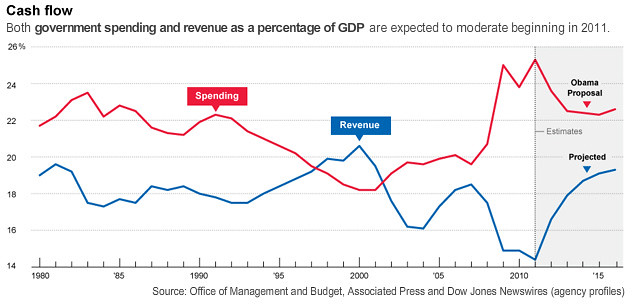quote:
Originally posted by Renegade Nation:
"We only have $3 to spend because that is all we demand from taxes."
OK...I get that. I don't necessarily agree with your assessment of the proper role of government...but that's another thread.
You say we "content ourselves" to having only $3 by lowering taxes...but in my orginal post and in the video, it is clear that despite very high tax rates and relatively low tax rates, historically government revenues are about 18% GDP...regardless of the tax rate.
Back to one of my orginal questions...why is that so? And how can higher taxes change that?
I think your analysis is a bit biased...you say our problem would be solved if "we stopped hitting the bars"...but we would also go a long way to solving the problems as well if instead of the "cheeseburger, fries, and coke" we settled for the bologna sandwich we could afford...
GDP is the variable in the equation; it can be, for example, $1 or $1 million.
GDP is the value of all final goods and services produced within the country during a year. What determines the overall level of output in an economy?
Demand determines output. You won't produce produce you can't sell. What determines the demand for your products?
The amount of disposable income in your aggregate customer pool determines demand (provided you have a desired product!). What determines the amount of disposable income?
How many people are employed and what they are paid determines the disposable income in your aggregate customer pool. Fewer employed workers and a stagnation or lowering of nominal wages will reduce disposable income, reduce demand, reduce output, thereby reducing GDP -- unless the difference is made up on credit, as has been increasingly done by the middle class.
Loss of jobs through outsourcing; lowering of wages by pushing higher-paid industrial workers into the lower-paid service sector; and the stagnation of wages from technological gains, where the increased profits floated directly to the top instead of being shared with the workers all lead to a lowering of GDP.
If GDP is a healthy $1 million, that 18% of GDP you speak of would amount to $180 thousand. If GDP is an anemic $1, GDP would equal 18 cents. $180 thousand provides more of social benefits people have come to expect than the figurative 18 cents.
Remember, GDP is variable. The cost of those social benefits is not. That is why we have only $3 to spend on a lunch that costs $4. A $4 lunch still costs $4, no matter how many dollars we choose to carry around in our pocket.
If you were a rich person, which would rather see: 1)your personal taxes increased to maintain that 18% of GDP, or 2)increase domestic hiring, with good wages for a broad-based increase in demand, so others can help you pay that 18% of GDP?
The dollar value of that 18% of GDP determines if we get a cheeseburger, fries, and coke; a bologna sandwich; or steak with all the trimmings.




